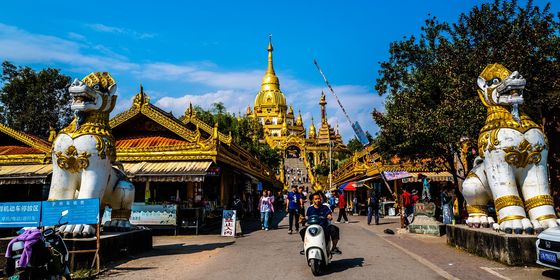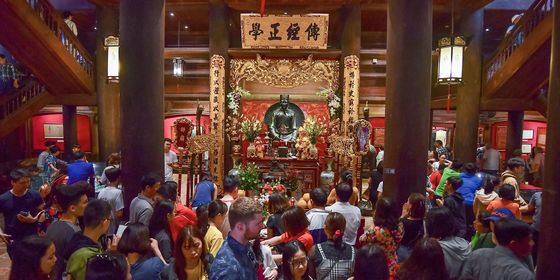Combating the effects of mass tourism with sustainability and common sense
As fun and innocent as it may seem, tourism is a major threat to the Chinese environment and traditional communities. Not only does mass tourism threaten historical and natural sites, but a shift to ecotourism has the potential to provide development to China’s naturally beautiful rural areas, which often suffer from a lack of development. With China’s economic miracle, more and more people are traveling to the country’s scenic hotspots, and the only answer to the destruction it is causing is building a tourism industry with minimal environmental impact. Ecotourism projects have sprung up around China in order to protect the country’s most scenic and historic areas from the destructive force of mass tourism.
Beijing-based EcoAction works to promote and organize projects that encompass a style of travel that is different; it is environmentally, culturally, and socially responsible. Through this more aware style of travel, the local community has a greater opportunity to benefit from the largess of visitors, while tourists have a more authentic travel experience.
“It has been an overused buzzword in both English and Chinese…[a] lack of awareness of the real ecotourism, the kind that benefits conservation and locals,” says Peng Luo, founder and chairman at EcoAction. The term, ecotourism, is relatively new, first coined by Mexican architect Hector Ceballos-Lascurain back in 1983. China, especially, has some pretty destructive tourism habits to overcome; indeed, the ecotourism ideal is about as far away from the bustling masses of tour groups throughout the country as can be.
However, ecotourism companies in China are becoming more popular, and one of the main selling points is that it can develop China’s more underdeveloped areas. A World Bank report on green development in China specifically mentions the ability of ecotourism and cultural tourism to help underdeveloped regions, specifically through directing responsible and non-environmentally destructive tourism toward poorer, rural areas. This has the potential to direct wealth in a constructive manner, preserving communities and their relationship with the environment.
Ecotourism tours generally involve sustainable and energy-efficient accommodation, largely self-sufficient restaurants attached to a farm or a vegetable garden, and a wide variety of outdoor activities. Trips can be planned according to interests, as some involve being active, while others offer the opportunity to relax in a serene environment. Popular destinations and trips in China include Yunnan Province, where there is plenty of space for walking and many opportunities to encounter ethnic minority life in the villages. Exploring the villages on bikes is a popular option with an extremely low carbon footprint.
Cai Jiaxi, a Beijinger, went on an ecotourism trip with EcoAction twice, and expresses how much she enjoyed the differences in travel. “Not only did we focus on the beautiful scenery, but we learned a lot as there were various experts with us, helping us to understand the ecosystem we were walking through.”
The focus is much deeper than the aspects of the environment that the eye can see, as Cai says: “The invisible beauty that I did not know existed was pointed out to us by the experts, as well as specific ways for individuals to conserve the environment”.
For China specifically, travel and tourism contributed, in total, nine percent of the GDP in 2013, and this figure is forecasted to rise by nearly eight percent per annum over the next 10 years. This prediction would put travel and tourism at 10 percent of China’s total GDP in 2024—a total of about 12 trillion RMB.
This money can be put back into local economies to help them build a better future and better tourism facilities, as well as environmental protection schemes. This is especially the case for domestic tourism in China, which in 2013 made up over 90 percent of all travel and tourism spending.
“We are still at the very beginning of ecotourism,” Peng says. “But more and more people both in and outside of the industry are becoming aware of the change it could mean for China. With successful pioneering work, the government will join us in our efforts to protect the environment.”
Tourism has played a key role in the destruction of some of China’s most important historical sites and can even destroy entire communities. Reports of the Great Wall crumbling under the pressure of tourism last year shed light on how hard the Great Wall is to protect and the pressures it faces under increased tourism. In particular, camping has been extremely harmful, with stakes from tents being left in the wall’s cracks. The same can be said of natural parks and other areas of natural beauty. In Zhangjiajie in Hunan, famous for providing the backdrop for the film Avatar, the amount of infrastructure built to accommodate tourists is simply shocking. Not only was the park covered in cable cars and buses—as well as the intricate queuing systems in front of all these—there was even a lift to the top of the mountain, where of course, you can find a huge McDonald’s. Despite the McDonald’s itself taking away from the aesthetics, just that one fast food restaurant created heaps of rubbish both in the car park and undoubtedly on the trails.
In order to change the way that mass tourism impacts the country, there has to first be a major turn-around in the nationwide attitude toward environmental discourse. During the very recent WTTC Global Summit in Hainan in April, 2014, the president and CEO of the WTTC, David Scowsill, carried the same message, saying, “standards of ethics and sustainability must be of the highest order. We need to work in true partnership with governments — when they listen —and with our local communities and stakeholders.”
Peng claims that there has already been a change in China’s citizens’ attitudes toward environmental degradation and the effects of tourism, allowing for a grain of hope for the industry to build on: “I believe people are becoming more and more concerned about the environment, especially because of the way pollution affects everyone’s daily life. Particularly, new parents are increasingly likely to be open-minded in changing their attitudes toward the relationship we build with our environment.”
However, China still has a lot of minds to change and a lot of people to engage in its environmental discourse, as Peng says: “It is still a long way to go for us to really participate in the action from a global perspective.”
Ecotourism, and an increase in environmental discussion amongst the public, could not have come at a more vital time for China. Although China boasts rapidly accelerating GDP growth figures, with this growth comes a lot of other problems.
For example, the Asian Development Bank report “Toward an Environmentally Sustainable Future” from 2012 shows an astonishing increase of per capita consumption of energy in the country. Increased funding for, and promoting interest in, ecotourism is a small step in putting China’s environment right, but it impacts China’s most delicate areas. Certainly, ecotourism is not the panacea for all of China’s environmental woes, but it can make a big difference in keeping China’s most beautiful, interesting, and ecologically diverse areas free from the pollution that all this economic success brings. Tourists will need to change their ideas about what makes a great holiday only slightly, but that shift will create tourist locations and activities that can outlast even China’s economic boom and be ready for the next one.












